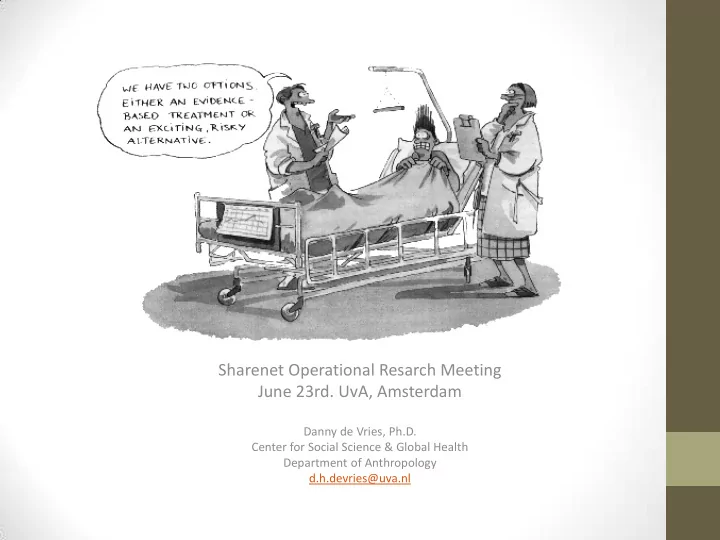

Sharenet Operational Resarch Meeting June 23rd. UvA, Amsterdam Danny de Vries, Ph.D. Center for Social Science & Global Health Department of Anthropology d.h.devries@uva.nl
Agenda What When Coffee and Tea 14.15 – 14.30 Welcome and agenda (Danny de Vries, Chair, UvA) 14:30-14:35 Brief round of introductions 14:35-14:40 Sharing OR research updates, with special 14:40-16:10 attention to how OR approach taken may influence how results are turned into “evidence” (10 min presentation + 5 min discussion) Brainstorm on constraints and opportunities of 16:10-16:55 turning OR data into evidence. Round of closing 16:55-17:00
Welcome to evidence • Pang (2007) - Can it work? Will it work? Is it worth it? • Last meeting systematic review: the golden evidence standard? Benzies et al. 2006 State-of-the-Evidence Reviews: Advantages and Challenges. Worldviews on Evidence-Based Nursing Second Quarter Pang T. Evidence to action in the developing world: what evidence is needed? Bull World Health Organ 2007;85:247.
Evidence-based policy-making Evidence-based policy- making’ (EBPM) - a legitimate policy development approach based on “scientific fact”. Qualitative study Behague et al. (2009) with program managers in Bangladesh, Burkina Faso, Ghana, Malawi and Nepal: • Limited impact on context-specific programmatic policy-development and implementation at the national and sub-national levels; • Promotes uniformity of methodological and policy approaches, despite call for disciplinary diversity in public health literature; • National evidence-based policies are found to hold little weight in countering global policy interests, which are legitimated, rather than informed, by evidence; • Interpretations of research findings shaped donors priorities driven by the need to provide generalizable research recommendations based on scientifically replicable methods. D. Behague et al. Evidence-based policy-making: The implications of globally-applicable research for context-specific problem-solving in developing countries. Social Science & Medicine 69 (2009) 1539 – 1546
Policy relevant evidence? Pang (2007) & Bowen & Zwi (2005): • Research is only one form of evidence for policy. • In health policy emphasis on context-specific research for national decision-making. • Context demands observational studies, qualitative research, “ experience ”, “ know-how ”, consensus and “ local knowledge ” • Researchers often do not see or recognize contextual factors • Different policy questions may require different types of evidence. • Evidence interacts with “context” before it is fully adopted in policy and practice • Effective knowledge transfer is not a “one off” event, rather it is a powerful and continuous process in which knowledge accumulates and influences thinking over time • Policy-makers should be involved from the start in defining policy question, processes for developing the evidence base, and interpreting reviews and evidence summaries. Syeda & Hydera (2007): Conduct and utilization of stakeholder analyses to determine the strength of the evidence for policy interface . Shamsuzzoha B Syeda & Adnan A Hydera. Evidence to action needs. Research. Bulletin of the World Health Organization, Sept 2007, 85 (9)
Bowen & Zwi 2005 – Evidence informed policy & practice pathway Bowen S, Zwi AB (2005) Pathways to “ evidence- informed” policy and practice: A framework for action. PLoS Med 2(7): e166.
Member presentations
Brainstorm • How to conduct a stakeholder analyses to determine the strength of the evidence for policy interface? in small groups discuss your evidence based using Bowen & Zwi’s model on evidence informed policy & practice pathway
Publishing your evidence Publishing programmatic results remains very limited, particularly in low income countries. Rujumba & Byamugisha (2012) argue to publish because: • A quality-control standard, • Opportunity for implementers to contribute to policy change • Sharing knowledge in more compressed and easy to read formats. • Wider dissemination of knowledge • Building skills of the individuals involved in the process of writing • Promoting accountability Fostering more collaboration between programme implementers and the academia should be promoted (e.g. mentorship, shared learning). Rujumba & Byamugisha 2012, Publishing operational research from ‘real life’ programme data: a better form of accountability. Tropical Medicine and International Health. Vol 7 (1):133-134.
Recommend
More recommend